
mannose [man-ohs] ExamplesWord Origin noun Chemistry.
- a hexose, C6H12O6, obtained from the hydrolysis of the ivory nut and yielding mannitol upon reduction.
Origin of mannose First recorded in 1885–90; mann(a) + -ose2 Examples from the Web for mannose Historical Examples of mannose
It appears to be resolved by ultimate hydrolysis into dextrose and mannose.
C. F. Cross
The osones from glucose, mannose, and fructose are identical.
Roscoe Wilfred Thatcher
The process is reversible; mannose can be converted to mannonic acid, thence to gluconic acid, thence to glucose.
Roscoe Wilfred Thatcher
The hydrazones of the common sugars, with the exception of the one from mannose, are colorless compounds, easily soluble in water.
Roscoe Wilfred Thatcher
Mannan bears the same relation to mannose that starch does to glucose and inulin to fructose.
Roscoe Wilfred Thatcher
British Dictionary definitions for mannose mannose noun
- a hexose sugar found in mannitol and many polysaccharides. Formula: C 6 H 12 O 6
Word Origin for mannose C20: from manna + -ose ² mannose in Medicine mannose [măn′ōs′] n.
- A monosaccharide obtained from various plants by the oxidation of mannitol.
mannose in Science mannose [măn′ōs′]
- A naturally occurring simple sugar that is a stereoisomer of glucose. Chemical formula: C6H12O6.
 Liberal Dictionary English Dictionary
Liberal Dictionary English Dictionary